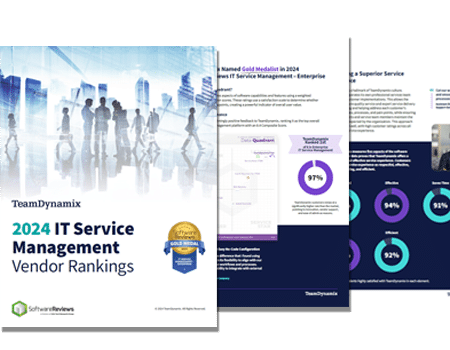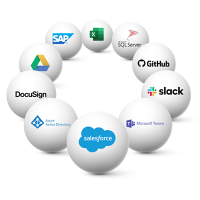
IT Service Management (ITSM): Self-Service Adoption
IT Service Management (ITSM) is evolving and with it, many IT leaders are seeking ways to improve service delivery. In a recent market study, 78%

The Info-Tech ranking report offers a unique view of the market based entirely on in-depth customer interviews. Download the Info-Tech ITSM Quadrant and Customer Viewpoint report today.

We’ll show you some of our best situations and show you exactly how to execute them to get immediate results. The best part is, iPaaS tools often feature easy-to-use click and drag functionality, meaning you don’t need a dedicated employee building integrations and workflows.

System Integrators, Value Added Resellers, Technology Providers, and Buying Consortiums can benefit from a partnership with TeamDynamix.

The Info-Tech ranking report offers a unique view of the market based entirely on in-depth customer interviews. Download the Info-Tech ITSM Quadrant and Customer Viewpoint report to gain a better understanding of key vendor strengths and emerging market requirements.
The construction industry can be very volatile, with a high employee turnover rate due to seasonal fluctuations in the workforce. A key challenge for the IT staff in this environment is the time spent onboarding and offboarding employees, issuing passwords and devices for new hires, and then keeping up to date on departures.
If construction firms don’t have a well-designed and automated system for managing IT service, “things can easily get lost or missed in the shuffle,” Jason Mohs, IT manager for the Walbec Group, said.
Based in Waukesha, Wisconsin, the Walbec Group is a vertically integrated organization of six companies that produce high-quality construction materials and deliver unparalleled professional design, engineering, and construction services.
When Mohs joined the company, approximately 90 percent of IT service requests were via email or phone. Help desk staff spent far too much time communicating with employees, collecting the information they needed to understand the problem completely, and passing requests along to the appropriate IT staff member. This process bogged down the already resource-constrained team.
TeamDynamix ITSM helped Mohs’ team become much more efficient as a cloud-based and highly flexible platform for managing IT and enterprise service tickets, projects, assets, and changes. TeamDynamix allows users to create customized service categories and build automated workflows for managing multistep processes without any required coding knowledge.
Too often, IT departments resemble firefighting squads, focusing most of their time on responding to problems and resolving crises instead of being proactive. With the help of TeamDynamix, the IT team is working more intelligently and efficiently, allowing them to be more strategic in their work. As a result, “we’re getting our house in order because we now have the time to do so,” Mohs said.
Here are three ways TeamDynamix has improved IT service desk outcomes at Walbec Group:
Moving to a self-service portal for ticket creation has saved IT staff at least two or three minutes per service request.
Mohs’ team has used the platform’s capabilities to create a robust self-service portal with customizable service categories and an archive of knowledge base articles.
When Mohs joined Walbec, some knowledge articles were already in place but weren’t easily searchable. TeamDynamix provided an easy way to store, organize, and make these assets available to employees. To build out these resources, Mohs has made it a goal for every IT staff member to create or edit at least one monthly knowledge base article.
The IT team has also built a comprehensive service catalog within the portal, complete with dynamic forms for quickly collecting information about the exact nature of an employee’s problem or service request. Mohs and his team have promoted using this portal for opening tickets throughout the company, explaining in staff meetings how employees can resolve their problems faster by using the portal.
These measures have streamlined the intake process for service requests dramatically. Often, employees can find answers to their questions or resolve their issues using the portal’s knowledge articles. They can initiate a service request within the portal if they can’t. The information collected during this process enables tickets to be routed automatically to the appropriate IT team member for a response — without help desk staff having to follow up and ask questions first.
Mohs now estimates that nearly three-fourths of service requests come in via the portal, saving the help desk team at least one to two minutes per request. With the volume of requests they get, “that makes a big difference,” he said. “It’s made us a much more efficient team.”
Automated workflows have streamlined employee onboarding and offboarding while ensuring no steps are missed.
Mohs’ team has set up automated workflows within TeamDynamix to initiate critical tasks in provisioning passwords, technologies, and network privileges for new hires and revoking these items when employees leave the company.
As a result, IT staff are saving time on these repetitive and labor-intensive tasks. In addition, “We don’t miss things anymore,” he observed.
Implementing a change management process has saved time and improved accountability.
Many IT incidents occur when someone changes one system, unexpectedly affecting others. Organizations can reduce the likelihood of this happening by focusing on effective change management practices.
No formal change management process existed when Mohs started working at Walbec. “We’ve built one out in TeamDynamix, and it’s been very effective,” he said.
Whenever someone intends to make a change that will affect employees and IT systems, like updating software or implementing a new technology, they must submit a plan within TeamDynamix. This plan must describe what steps the change will involve, when the change will occur and why, and which other systems, technologies and users the change might affect. The plan is then reviewed and approved by the managers of the affected IT divisions.
This documentation process forces people to think carefully about the repercussions of any changes they make, thus reducing the chances that something will go wrong. It also creates a public record of the intended change. If something unexpected occurs, managers can quickly identify the cause of the problem and respond.
“I don’t have to email everyone in my department to find out what they did and when,” Mohs explained. “It takes away this potential time drain. Instead, I know exactly where to look to find what I need and troubleshoot if needed.” And because the information is all there, Mohs and his team can respond quicker if there’s a problem instead of trying to find where the issue originated.
The efficiencies Mohs and his team have gained from using TeamDynamix have enabled them to focus on becoming more strategic. They’re using this extra time to take on projects they couldn’t get to before, such as cleaning up user accounts within Active Directory and addressing the root cause of frequent IT issues.
In turn, the end-users are experiencing better IT service and faster resolution of their problems, allowing them to do their jobs more effectively and enhancing the company’s bottom line.
“I’ve worked with other ticketing systems before,” Mohs concluded, “We are happy with the benefits we’ve realized so far, and we see a lot of potential for even further growth moving forward on the TeamDynamix platform.”

IT Service Management (ITSM) is evolving and with it, many IT leaders are seeking ways to improve service delivery. In a recent market study, 78%

For nearly all organizations, IT Service Management (ITSM) stands as the backbone of operational efficiency, ensuring that IT services align not just with the needs

The IT service desk plays a critical role in any organization, serving as the primary point of contact between customers/end users and the IT support
TeamDynamix’s award-winning SaaS cloud solution offers IT Service and Project Management together on one platform with enterprise integration and automation.
[email protected]
(877) 752-6196
Contact Us
